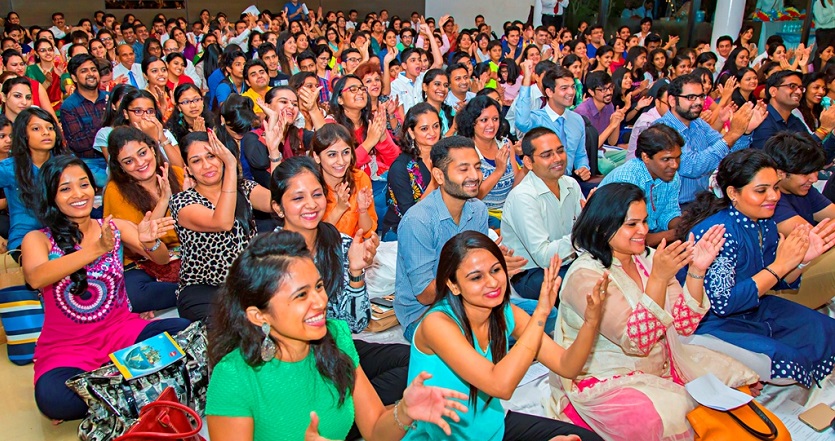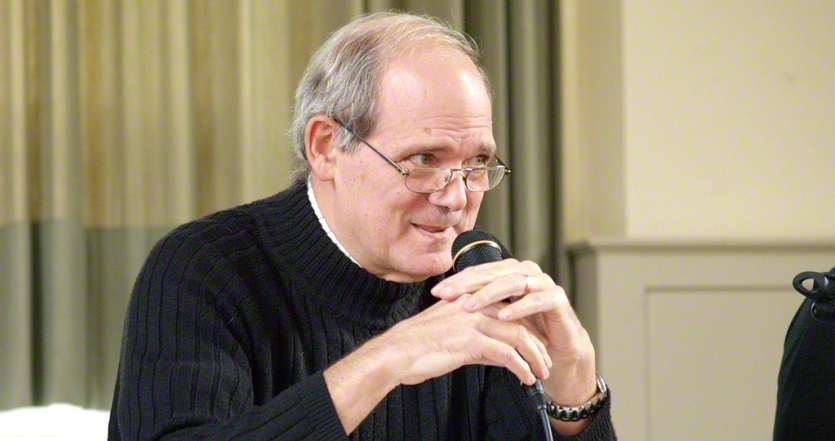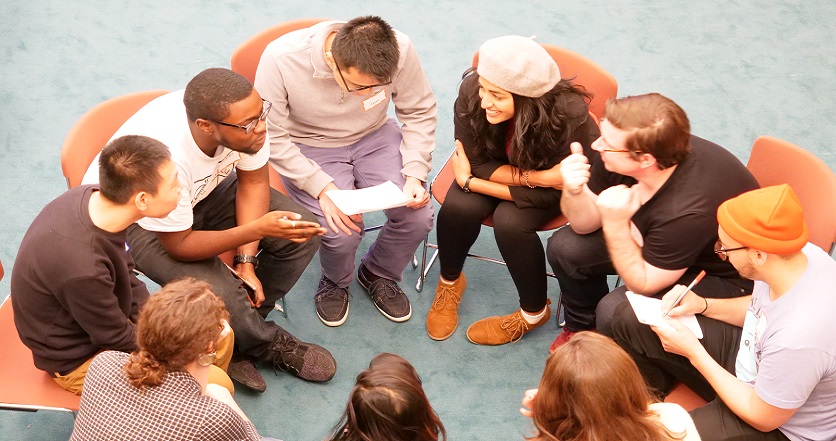Illuminating the Universality of Buddhist Wisdom
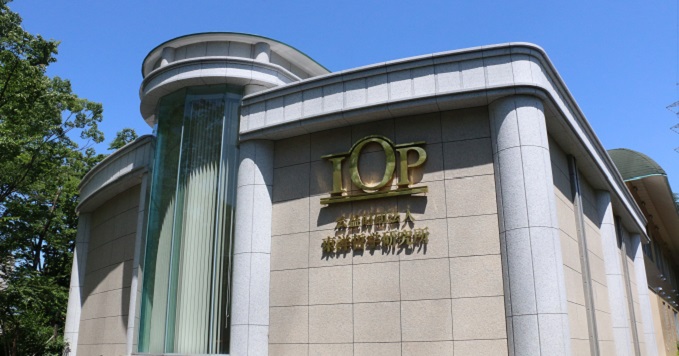
The following is an interview with Akira Kirigaya, director of the Institute of Oriental Philosophy (IOP), located in Tokyo, Japan. The IOP, a Public Interest Incorporated Foundation, was founded by Daisaku Ikeda in 1962 to promote research on the cultural and philosophical heritage of Asia and expose Buddhism to scholarly inquiry to clarify the essentials of Buddhism and its universal values.
The Institute of Oriental Philosophy (IOP) marked the 60th anniversary of its founding in 2022. Upon what principle was the institute founded, and what is its mission?
The idea of establishing the institute dates back to February 1961 when Daisaku Ikeda, the founder of the IOP, visited Bodh Gaya, India, the birthplace of Buddhism, for the first time.
Shakyamuni Buddha’s teachings, known as Buddhism, spread not only in India but throughout Central Asia, Southeast Asia, China, the Korean Peninsula, and then to Japan, laying the foundation for the blossoming of rich culture. But as the centuries passed, Buddhism became formalized and ceremonial, and its cultural influence gradually declined.
During his visit to India, Mr. Ikeda pondered how the legacy of Buddhism, which had enriched the human spirit, could be revived in the modern age and returned to its fundamental mission of liberating people from suffering. He concluded that it was crucial to expand awareness of the essentials of Buddhism and its universal values, especially the teachings of the Lotus Sutra—a Mahayana sutra—in every aspect of society through exposing it to scholarly inquiry. He also wanted to ensure that Buddhist philosophy would contribute to the resolution of various issues facing humanity. It was for this purpose that the IOP was founded in January 1962. Today, it has developed into an institute conducting multifaceted research into the religions, philosophies and cultures not only of the East but also those from around the world.
One of the institute’s core activities is interfaith dialogue. The IOP has been engaged in intercultural and interreligious dialogue with leaders of various religions and research institutions. What is the significance and purpose of conducting such conversations?
Currently, the world is facing every kind of crisis imaginable: conflicts, environmental issues, nuclear threats, poverty, hunger and the recent pandemic, to name just a few. How can humanity overcome division and distrust and unite to face these challenges?
Discussion on the solutions to such issues focuses mainly on material aspects such as political and economic measures. However, we believe that neither individual happiness nor world peace in the truest sense can be achieved without improving human morality and transforming the human spirit. This guiding philosophy is the impetus behind all the institute’s activities.
Mr. Ikeda discussed this point in a message he sent to the IOP on the 50th anniversary of its founding.
He categorizes the global issues facing humanity into three areas: global environmental problems, symbolized by global warming; social, political and economic challenges, including nuclear arms and ethnic and racial conflicts; and a crisis of the human spirit and a degeneration of ethics and morals, which is, he says, the source of all these challenges. In the message, he stressed that now is the time to work together to transform the human spirit.
Many world religions originated with the intention of bringing happiness to the people. Even though religious belief systems differ, there is universality in the philosophies longing for peace. Interfaith dialogue is essential for discovering common ground and fostering cooperation toward a realization of a greater purpose, avoiding theological debates and competition over the superiority of teachings.
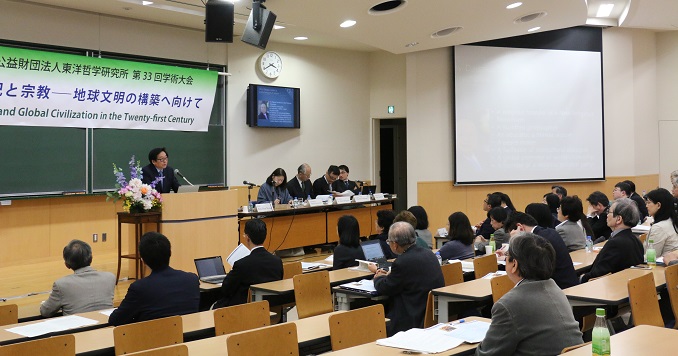
How do you think the teachings of Mahayana Buddhism can contribute to solving the global-scale problems we are facing today?
The philosophy of the dignity of life runs throughout Mahayana Buddhism, particularly the teachings of the Lotus Sutra. Based on this philosophy, Mahayana Buddhism aims to reveal the Buddha nature (the life state of Buddha) inherent in all people and emphasizes the practice of the Bodhisattva way of life to achieve this goal. We have a tendency to seek happiness for ourselves only. The Bodhisattva way of life, on the other hand, is a way of living that enables us to take action not only for ourselves but also for the happiness of others. This way of life involves reverence and consideration for human beings and also for the natural environment.
We believe that the key to solving global issues is to share the philosophy of the dignity of life expounded in the Lotus Sutra. We want to promote an awareness of this philosophy around the world, as well as the Bodhisattva way of life that enables one to manifest the qualities of Buddhahood to transform the energy of hatred and destruction into goodness, compassion and courage.
Besides interfaith dialogues, what other activities does the IOP take part in?
Over several decades, the IOP has conducted dialogues with academic and research institutions worldwide. I will just name a few major institutions here: the Institute of World Religions of the Chinese Academy of Social Sciences, Harvard University’s Center for the Study of World Religions, the Harvard-Yenching Institute, the European Academy of Sciences and Arts, the Brazilian Academy of Philosophy, and the University of Malaya’s Centre for Civilisational Dialogue.
Besides interfaith dialogues, we have focused on promoting our exhibition, “The Lotus Sutra―A Message of Peace and Harmonious Coexistence.” This exhibition showcases IOP’s research on the Lotus Sutra and introduces its teachings and the history of its dissemination, made possible with the support of the Dunhuang Academy in China, the International Academy of Indian Culture and the Institute of Oriental Manuscripts of the Russian Academy of Sciences.
To date, about one million people in 17 countries and territories, including Japan, have viewed the exhibition. In addition, the IOP’s exhibition “Buddhist Sutras: A Universal Spiritual Heritage—Manuscripts and Iconography of the Lotus Sutra,” which focuses on the broader scope of Mahayana sutras, has been viewed by the public since 2016. Wherever our exhibitions are shown, I feel the unifying power of culture to connect people and foster dialogue transcending differences in philosophical and religious beliefs.
For instance, when we held the Lotus Sutra exhibition in Indonesia, where Muslims comprise nearly 90 percent of the population, we were very fortunate that the country’s public broadcasting system reported on the exhibition and about how local Soka Gakkai members around the world have supported the exhibition showings in their respective countries.
In Thailand, where Theravada Buddhism is predominant, I witnessed many Buddhist monks, accompanied by a group of apprentices, viewing the Lotus Sutra exhibition. I remember being impressed by their willingness to learn from the exhibition, despite practicing a different form of Buddhism. Similarly, in Singapore, where many religions coexist, the exhibition showing was filled with people of various faiths. It felt like were convening an interfaith summit. I was moved by everyone’s shared desire for peace and the happiness of all people, as well as their open-mindedness to learn from the exhibition, despite being from different faith traditions.
-
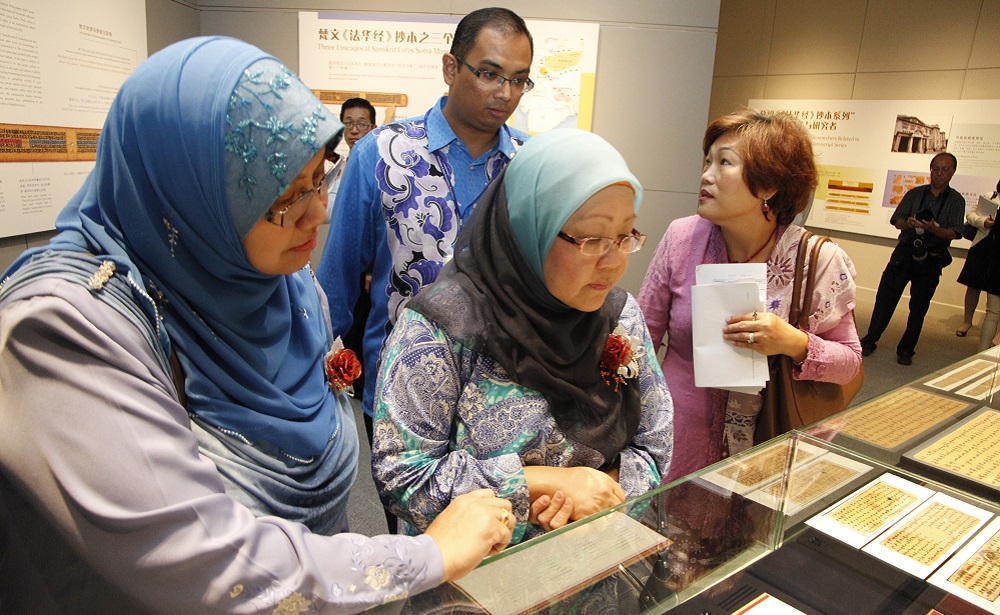 Viewing the Lotus Sutra manuscripts in Malaysia [© IOP]
Viewing the Lotus Sutra manuscripts in Malaysia [© IOP] -
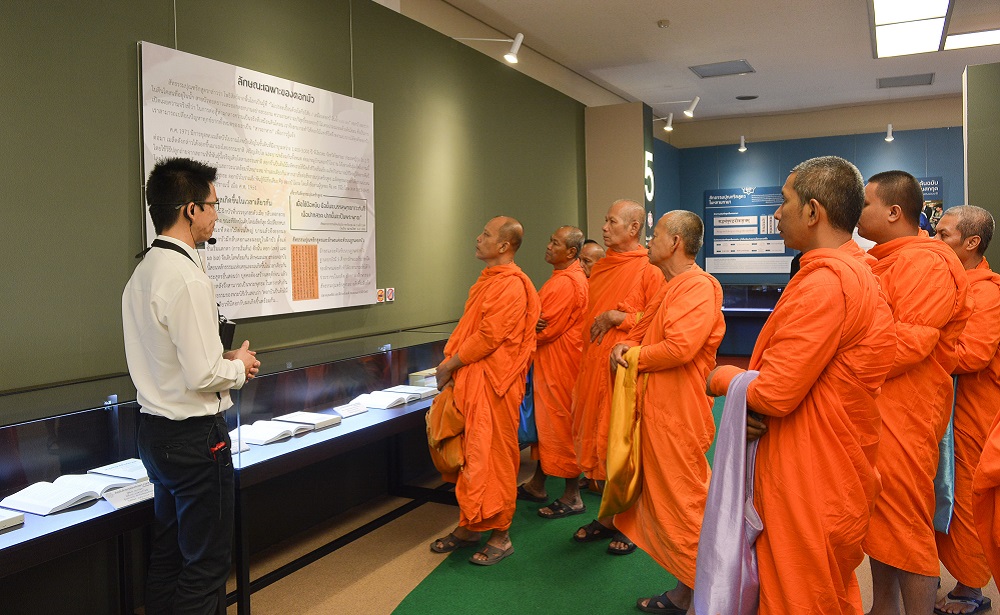 Viewing the Lotus Sutra exhibition in Thailand [© IOP]
Viewing the Lotus Sutra exhibition in Thailand [© IOP]
This is why the IOP would like to put more energy into the Lotus Sutra exhibition, to provide more opportunities to promote and deepen understanding of shared values.
In this age of turmoil, many youth in Japan and around the world are searching for something that can serve as the foundation and guiding principle of their lives. What message can you share with these youth?
It may seem easier to pursue happiness for yourself alone. However, such happiness is ephemeral and doesn’t lead to true fulfilment. A philosophy that can cultivate the mutual happiness of both ourselves and others and respect for the environment is essential to leading a rewarding and productive life.
When our founder, Mr. Ikeda, had a dialogue with renowned British historian Arnold J. Toynbee in the early 1970s, they agreed that the dignity of life is the universal value common to all humankind. Dr. Toynbee spoke about how the philosophy of the dignity of life would lead to respect for human dignity, nature and, ultimately, the entire universe.
As a starting point, I think the inner transformation of each person is first and foremost. To this end, it is crucial to have a reliable philosophy one can put into practice to facilitate this inner transformation. The inner change of a single individual, based on the philosophy of the dignity of life, will lead to change in other people, the local community and even the world.





